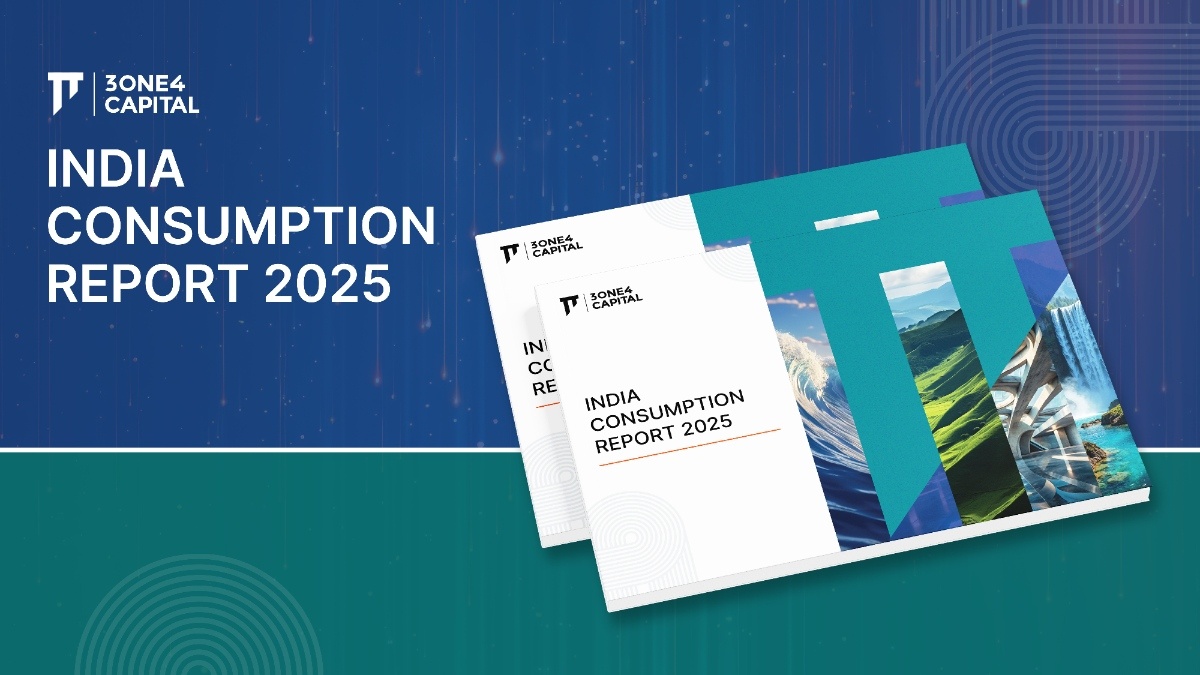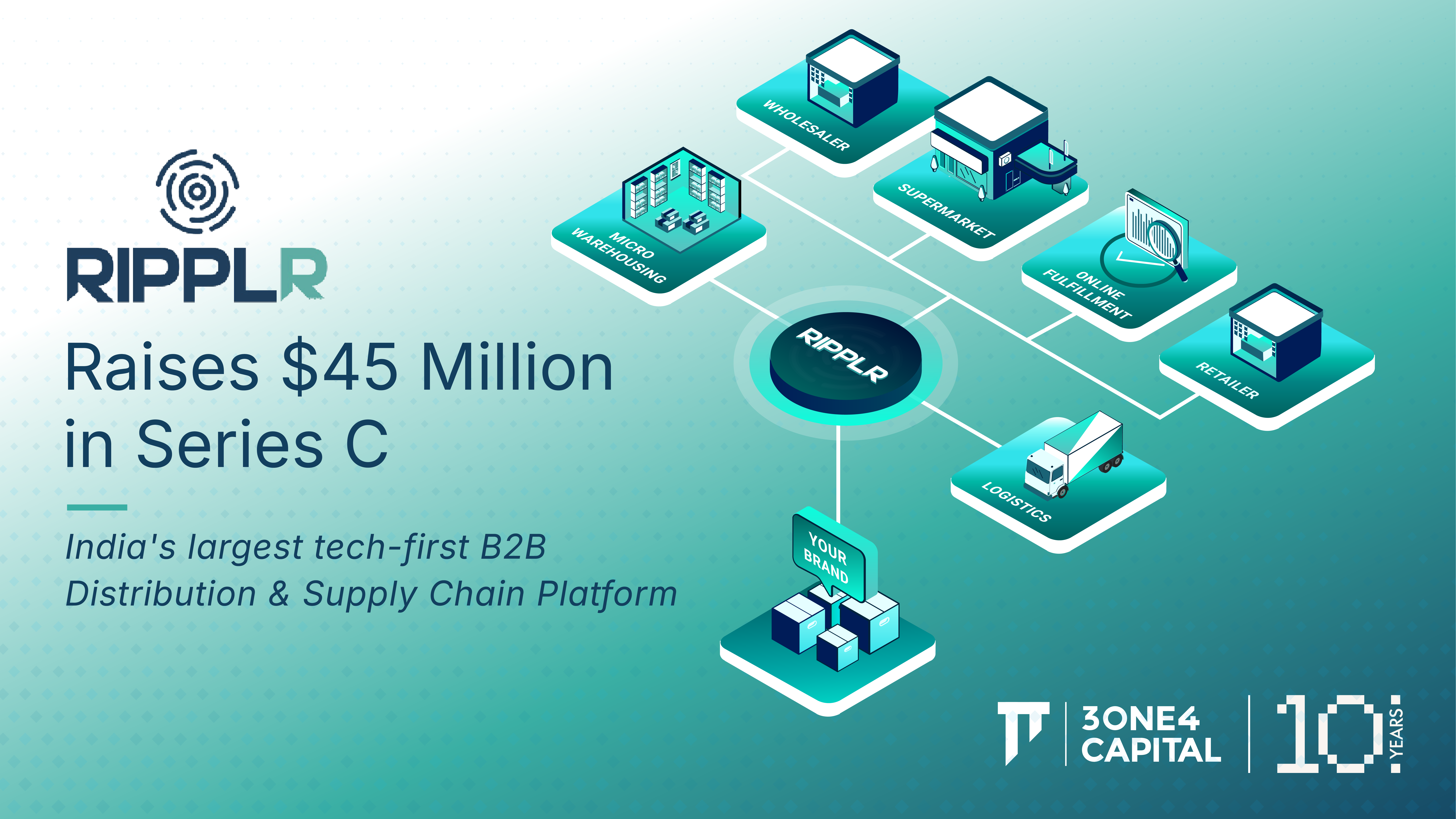
Decoding the Indian Consumer: Insights from ‘The Consumption Economy’
The Indian consumer landscape is a complex and rapidly evolving market driven by a unique blend of cultural nuances, economic realities, and shifting consumer preferences. Against this backdrop, 3one4 Capital hosted ‘The Consumption Economy’ to delve into the heart of this dynamic market, offering a roadmap for companies to navigate and thrive in this exciting and evolving frontier.
The event brought together visionary founders at the forefront of India's consumer technology, sharing their expertise on building category-defining businesses and platforms that resonate with the digitally-driven demographic. The discourse also highlighted the significance of strategic distribution, compelling content, and engagement methods in driving the growth of the emerging Indian consumer base. Presented below are the key takeaways from these insightful conversations:
Value-Oriented Mindset
The Indian consumer strikes a delicate balance between quality and cost. They seek exceptional quality at a fair price, making them highly discerning when it comes to spending. Companies must prioritise high-quality products, justify their pricing, and effectively communicate the value proposition to resonate with these value-conscious buyers.
Lal Chand Bisu, Co-Founder and CEO at KukuFM, advocates businesses to strike a "sweet spot" with their offerings. Consumers crave the feeling that they're receiving substantial value for their money, as evidenced by KukuFm’s own experience. Despite raising their subscription price from 20 rupees to 99 rupees per month, conversion rates remained unchanged, indicating a willingness to pay for perceived value. However, delivering that value is paramount. Customers abandon services lacking in worth, with numerous alternatives readily available.

Shifting Towards Premium
Indian consumers are increasingly seeking premium products and experiences. Rising disposable incomes and aspirational desires are driving this shift. Digital influence, evolving definitions of "premium," and the rise of e-commerce further fuel this trend.
Achieving true premiumisation requires a deep understanding of consumer expectations and a relentless focus on delivering a superior product experience. Illustrated by Vivek Gupta, Co-Founder of Licious, the path to premiumisation necessitates tailoring offerings to the distinct needs and preferences of the target audience. Licious exemplifies this by providing region-specific mutton cuts, acknowledging the diversity in consumer preferences. This nuanced approach empowers them to command a premium.
“We are now talking of chicken as an industry. This is fundamentally a different product. If consumers grasp the idea that they are consuming or buying a superior product, the conversation of price will shift. While there are quantitative measures like pricing premiums and elasticity to consider, the essence of any journey towards premiumisation lies in enabling consumers to tangibly perceive, articulate, or sense that they're engaging with a superior product.” - Vivek Gupta, Co-Founder of Licious.
He underscores the pivotal role of precise communication, using terms like "juicy" for their chicken to convey product value effectively. Vivek notes that premiumisation is a journey, not a destination. Licious continues to invest in R&D and product development to stay ahead of the competition and constantly improve its offerings.
Omnichannel Journey
The Indian consumer embraces a multi-channel approach to shopping, seamlessly navigating between online and offline platforms. They research online, compare prices, and make informed decisions before purchasing online and in physical stores. Developing an omnichannel strategy unlocks a world of possibilities for brands, boosting reach and engagement across diverse touchpoints.
Kapiva's methodical approach to offline expansion, including strategic partnerships and human interfaces, provides valuable insights for brands seeking a physical presence.
Kapiva's online success stems from building trust through consumer testimonials and doctor endorsements. However, offline sales require a human touch. They've found success placing brand ambassadors in large stores and exploring niche channels like gym stores for specific products. While these "hacks" may not lead to explosive growth in the next few years, they're crucial for Kapiva's current stage as they navigate beyond the online realm and into the offline world.
Customer-Centric Approach
Understanding and addressing consumer needs is paramount. Cultivating strong customer relationships unlocks a powerful growth engine for brands, leading to valuable feedback and continuous improvement.
Wakefit's growth journey is a testament to the transformative power of customer-driven product expansion and scale. Chaitanya Ramalingegowda, Co-Founder at Wakefit, notes that pillows, bedsheets, and even furniture – each addition to their sleep-solutions portfolio emerged from direct consumer feedback, ensuring perfect alignment with their needs. While mattresses remain Wakefit’s core product, the diversification into furniture, now accounting for a significant 42-45% of revenue, exemplifies the importance of strategic expansion for sustainable growth.
“It's not PMF alone; it's PMF expansion every 18 months,” said Chaitanya Ramalingegowda, Co-Founder at Wakefit.
Wakefit's philosophy hinges on a relentless pursuit of "PMF expansion every 18 months." This goes beyond achieving product-market fit to continuously adapt to evolving customer preferences. This customer-centric innovation fuels their rapid growth, with furniture experiencing a remarkable 60% YoY increase compared to mattresses' 30% growth.
Addressing CAC as User Base Scales: A Multi-pronged Approach
Vivek emphasised the significance of managing CAC (Customer acquisition cost) beyond just performance marketing. He advocates a holistic approach that balances brand building, including ETLs (Earned Through Loyalty) and consumer awareness, with performance marketing. As the user base grows, brand awareness, measured by organic acquisition, should rise proportionally, eventually flattening CAC.

Customer loyalty and retention rates are a high priority at Licious. They set a high standard, considering anything less than weekly orders a potential concern. Their strategic approach revolves around critical insights, including:
- Identifying the "inflection point" where retention tends to plateau.
- Significant emphasis on guiding new customers through the crucial early orders, recognising the pivotal role these initial interactions play in long-term customer satisfaction.
- Personalising the customer experience beyond the initial phase.
Licious meticulously analyses individual buying patterns, forming dynamic customer segments based on preferences and habits. This constant data-driven segmentation avoids "cohort fatigue" and allows for targeted solutions. For instance, their loyalty program was crafted specifically for a segment with high yearly retention but low monthly orders, unlocking a 500 crore opportunity. Licious’ focus on finding market size within existing customers rather than relying solely on continuous acquisition efforts represents a strategic approach for success that is both cost-effective and highly impactful.
Content Marketing as a Customer Acquisition Engine
Aditi Shrivastava, Co-founder and CEO at Pocket Aces, argues that consumer brands struggle to achieve high virality with their content because they focus on pushing products rather than creating engaging, non-transactional content like media companies. Reliance on transactional content alone can limit reach and engagement. Brands seeking to maximise impact can tap into new audiences through broader distribution channels. She cites Netflix as a successful example of a brand that prioritises engaging content over product promotion, leading to a larger and more engaged audience.
How Optimised Distribution Fuels Brand Growth
India's FMCG (Fast Moving Consumer Goods) opportunity is significant. It is the fourth largest contributor to the country's GDP at around 2.5%. The consumption is expected to reach nearly $200 billion by 2025.
Abhishek Nehru, Co-founder at Ripplr, notes that despite the scale, there are notable gaps in distribution. The market is currently dominated by four large distributors handling the last-mile ecosystem from brands to retailers. The challenge arises in managing these distributors efficiently. Large brands struggle to manage their major distributors, while new entrants lack access to crucial retail channels. Ripplr, a full-stack tech-enabled distribution platform, bridges these gaps and streamlines the entire process.
An optimised distribution network transcends mere logistics – it becomes a strategic asset. Bridging geographical gaps, expediting deliveries, and ensuring consistent product availability unlocks previously inaccessible markets and fosters brand trust. This, in turn, leads to improved customer acquisition, while minimising purchase friction improves customer retention. A robust distribution network is not just an operational efficiency – it's a potent catalyst for sustainable brand success.

Unlocking growth in the Indian market requires a deep understanding of the consumer landscape. By focusing on value, catering to evolving preferences, and adopting an omnichannel approach, brands can establish a strong foothold in this dynamic market.
India’s surge of consumerism holds the potential to redefine the country’s global economic standing, driving transformative change across industries and communities. We are delighted by the community's passionate response to the consumer growth narrative and the potential it holds for building purposeful companies with compelling value propositions.
We look forward to hosting more stimulating conversations.
DISCLAIMER
The views expressed herein are those of the author as of the publication date and are subject to change without notice. Neither the author nor any of the entities under the 3one4 Capital Group have any obligation to update the content. This publications are for informational and educational purposes only and should not be construed as providing any advisory service (including financial, regulatory, or legal). It does not constitute an offer to sell or a solicitation to buy any securities or related financial instruments in any jurisdiction. Readers should perform their own due diligence and consult with relevant advisors before taking any decisions. Any reliance on the information herein is at the reader's own risk, and 3one4 Capital Group assumes no liability for any such reliance.Certain information is based on third-party sources believed to be reliable, but neither the author nor 3one4 Capital Group guarantees its accuracy, recency or completeness. There has been no independent verification of such information or the assumptions on which such information is based, unless expressly mentioned otherwise. References to specific companies, securities, or investment strategies are not endorsements. Unauthorized reproduction, distribution, or use of this document, in whole or in part, is prohibited without prior written consent from the author and/or the 3one4 Capital Group.


.webp)












